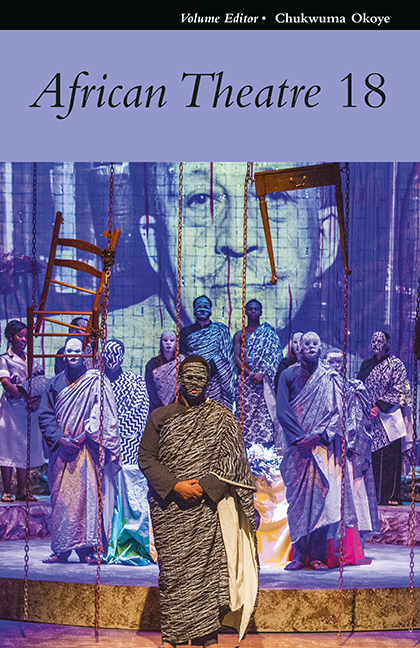Introduction
Published online by Cambridge University Press: 02 April 2020
Summary
African theatre has a long history steeped in very rich oral traditions. From this ancestry, diverse performance forms and styles have evolved, such that today African theatre boasts of a rich tapestry of performance practices, reaching from the oral to the literary. Martin Banham acknowledges ‘the extraordinary complexity of African performance culture, of its richness, agelessness and beauty’. (2004: xvii) He observes that the ‘variety of performance forms in African societies is immense, ranging from dance to storytelling, masquerade to communal festival, with a vibrant and generally more recent “literary” and developmental theatre’ (xv). Similarly, this variety of forms is replicated in a thematic gamut that embraces practically every sphere of material and spiritual existence: from the social to the political, the sacred to the profane, the esoteric to the everyday. As an area of study, scholars have engaged the phenomenon from a wide range of perspectives. Although much progress has been made in this pursuit, the heterogeneity of performance forms and their structural diversity, as well their productive interactions with Western and Eastern cultures, continue to enrich the variety of forms as well as the vigorous debates they generate on the traditions of African theatre and performance today.
This first open issue of African Theatre signals a departure from the traditional themed format. It compositely exemplifies the acknowledged plethora of performance forms, approaches and perspectives that populate the contemporary field of African theatre and their continuous evolvement informed by the ever-changing realities of everyday encounters, as well as the wealth of discourses they continuously beget. Focusing on case studies, contributors from Ethiopia, Malawi, Nigeria, South Africa and Ghana engage a variety of performance forms from diverse methodological and thematic lookouts. These range from investigations of radical dramatic and popular musical performances, through ‘street theatre’ (festivals and masquerade shows) and popular culture, to applied theatre, dance, audience/spectatorship, cultural performances and folktales. Thematic coverage embraces African-American and African cross-cultural dialogue, choreographic fiesta and the search for national identity, carnivalization and the demystification of ritual essence in emergent Nigerian carnivals. Others include a study of theatre audience behaviour, challenging stigmatization of disability through Theatre for Development, incorporation of indigenous cultural and dramatic elements in play performance, and metaphysical essence in folktale performance.
- Type
- Chapter
- Information
- African Theatre 18 , pp. xiii - xxPublisher: Boydell & BrewerPrint publication year: 2019

